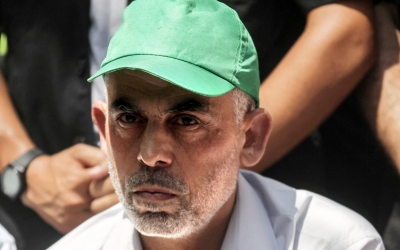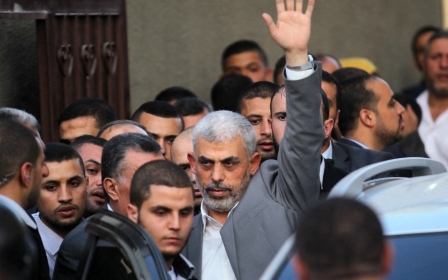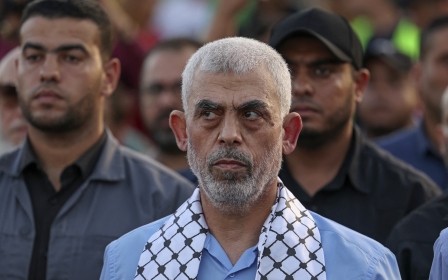Sinwar may be dead, but the resistance to Israel will continue, Hamas official says
The killing of Hamas leader Yahya Sinwar will not deter the Palestinian people from resisting Israeli occupation and fighting for their "freedom and dignity", a senior Hamas official told Middle East Eye.
Sinwar, who had served as the top Hamas leader in Gaza since 2017, was killed on Wednesday during combat with Israeli forces.
His killing was announced on Thursday when the Israeli military released drone footage showing the Hamas chief flinging a stick in the direction of an approaching drone in a partially destroyed house. Shortly afterwards, the Israeli army shelled the building, killing the 61-year-old leader.
The Israeli military's video went viral across social media and was accompanied by quotes from Sinwar's past speeches in which he said he would rather die in battle than surrender.
Basem Naim, a senior member of Hamas' political wing, told MEE that while it was "distressing to lose beloved people", the killing did not mark the end of the Palestinian movement.
New MEE newsletter: Jerusalem Dispatch
Sign up to get the latest insights and analysis on Israel-Palestine, alongside Turkey Unpacked and other MEE newsletters
"It seems that Israel believes that killing our leaders means the end of our movement and end of the struggle of the Palestinian people," he said.
"They repeated those same statements when they killed [the group's founder] Sheikh Ahmed Yassin, and [then another leader] Abdel Aziz al-Rantisi. But each time, Hamas became stronger and more popular.
"Hamas is a liberation movement led by people looking for freedom and dignity. This cannot be eliminated," he added.
On Saturday, three days after Sinwar was killed, the Israeli military dropped leaflets in southern Gaza showing an image of the Hamas leader lying dead on a chair, with his finger severed and blood running down his forehead. “Sinwar destroyed your lives. He hid in a dark hole and was liquidated while escaping fearfully,” the leaflet said.
'Hamas is a liberation movement led by people looking for freedom and dignity. This cannot be eliminated'
- Basem Naim, Hamas official
But Wael al-Saqqa, the secretary general of the Jordanian Islamic Action Front (IAF) party, said the manner in which Sinwar was killed set him apart from many of his predecessors who were also assassinated by Israel.
"Sinwar was martyred while clashing with the enemy while carrying his weapon and did not flee," he said.
"This will not weaken the resistance; instead, new leaders will emerge."
Following the announcement of Sinwar’s death, Hamas' Lebanese ally, Hezbollah, vowed to escalate its fight with Israel and Iran, which supports both groups, said Sinwar's death would strengthen regional "resistance" to Israel.
Several analysts told MEE that, despite the celebrations by Israeli and Biden administration officials over Sinwar’s killing, Hamas would regroup and continue its resistance against Israeli occupation.
"Sinwar's death will not affect the level of fighting in Gaza," Amer al-Sabaileh, a Jordanian political analyst and professor of political science, told MEE.
"Perhaps the resistance will move to a state of disorganised decentralisation, and this could prove difficult for the Israelis to control," he added.
Hamas strikes defiant tone
Born in a refugee camp in Gaza's Khan Younis to parents who had been forced to flee their homes in what became Israel in 1948, Sinwar first came to prominence in 1985 when Yassin appointed him to co-lead an internal armed enforcement agency called al-Majd.
In 1988, at the age of 26, Sinwar was arrested and given four life sentences for orchestrating the abduction and killing of two Israeli soldiers as well as the execution of four Palestinians suspected of cooperating with Israel.
According to his interrogators, Sinwar admitted, without remorse, that he had personally strangled one of the victims with his bare hands.
During his 22 years in an Israeli prison, Sinwar learned Hebrew and wrote an autobiographical novel in 2004 titled The Thorn and the Carnation, which has been partly translated into English.
In the book, Sinwar’s alter ego, Ibrahim, is portrayed as a committed figure in the Palestinian cause who expects others to be "ready to sacrifice everything for their pride, dignity and beliefs".
In 2011, at the age of 48, Sinwar was released along with more than 1,000 Palestinians as part of a prisoner swap for a single Israel soldier, Gilad Shalit.
'Hamas will be affected for a short period at the leadership level, but the group represents an idea and an ideology that does not end with the death of one person'
- Mamoun Abu Nowar, retired Jordanian major-general
Steadily rising through Hamas' ranks after his release, Sinwar was appointed the movement’s top leader following the July assassination of Ismael Haniyeh in an apparent Israeli strike in Tehran.
Sabaileh said that Hamas, as both a political and military force, has survived the assassinations of multiple leaders over the decades, and this latest killing should not be seen as a death knell for the group.
He anticipates that Hamas will replace Sinwar with a new political leader based outside of Gaza. In its leadership deliberations, Hamas would have to consider other political factors, such as the interests of the host state where the new leader resides.
"Choosing Sinwar as head of the political bureau was a mistake by Hamas," he said. "I believe that Hamas will reconsider the political bureau and the role required of it in the next stage, and thus Hamas will deal with the betting card differently in the future."
Sinwar's deputy, Khalil al-Hayya, seen as a potential successor, struck a defiant tone on Friday, saying that Israeli hostages would not be returned until Israeli troops withdrew from Gaza and the war ended.
Israeli Prime Minister Benjamin Netanyahu rejected such terms, reiterating that Hamas must be completely destroyed before Israel would agree to end its war.
Over the past year of intense Israeli attacks, at least 41,000 Palestinians have been killed, the vast majority of them women and children, alongside Hamas fighters and senior figures both inside and outside Gaza.
Israeli strikes have levelled much of the strip, driving 90 percent of the Palestinian population from their homes at least once and bringing over 1.8 million people to crisis levels of hunger, according to the Integrated Food Security Classification (IPC).
No guarantees Israel seeks to end war
Mamoun Abu Nowar, a retired Jordanian major-general and military expert, told MEE that Israel's intensified assault in north Gaza and the decision to tighten its siege on the enclave had extinguished any hopes that Sinwar's killing might bring an end to the conflict.
"Hamas will be affected for a short period at the leadership level, but the group represents an idea and an ideology that does not end with the death of one person," he said.
Since US President Joe Biden took an unprecedented step in May to unveil a three-phase ceasefire deal from the White House, optimism about reaching a deal has ebbed and flowed until it appeared to be off the table entirely.
Already, the White House seems to be curbing the enthusiasm it channelled on Thursday regarding the prospects of reviving a deal.
On Friday, Biden said the US may be able to end fighting in Lebanon between Hezbollah and Israel, but a ceasefire in Gaza is "going to be harder".
His comments came days after Israeli media reported evidence that a plan to ethnically cleanse northern Gaza and kill any remaining Palestinians was underway.
Three Israeli reserve soldiers serving in Gaza told Haaretz that they believed the "Generals' Plan", also known as the Eiland Plan, is being implemented.
"The goal is to give the residents who live north of the Netzarim area a deadline to move to the south of the strip. After this date, whoever will remain in the north will be considered an enemy and will be killed," a soldier stationed in the Netzarim Corridor was quoted as saying.
Abu Nowar warned that with northern Gaza being reduced to a wasteland and more than a million people on the brink of famine, the situation was as bleak as ever.
"The West, led by Biden, believes that Sinwar's death will lead to a prisoner exchange, but this will not lead to a ceasefire," he said.
"What guarantees are there that Israel will not wage another war again?
"The situation is very bad."
Middle East Eye delivers independent and unrivalled coverage and analysis of the Middle East, North Africa and beyond. To learn more about republishing this content and the associated fees, please fill out this form. More about MEE can be found here.





